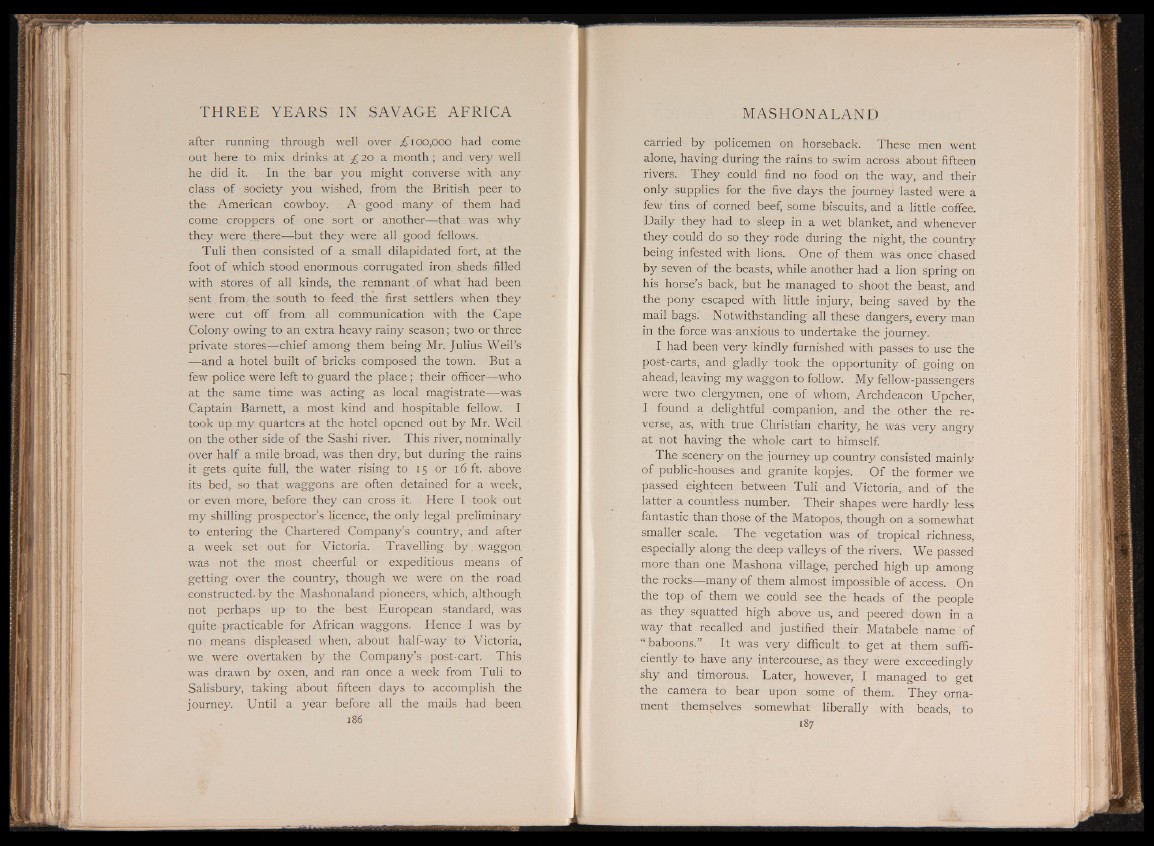
after running through well over £ i oo,ooo had come
out here to mix drinks £ 20 a month; and very well
he did it. In the bar you might converse with any
class of society you wished, from the British peer to
the American cowboy, A good many of them had
come croppers of one; sort or another-Ahat was why
they were there—but they were all good fellows.
Tuli then consisted of a small dilapidated fort, at the
foot of which stood enormous corrugated iron sheds filled
with stores of all kinds, the remnant. of what had been
sent from the south to feed, the first settlers when they
were cut off from all communication with the Cape
Colony owing to an extra heavy rainy season; two or three
private stores—chief among them being Mr. Julius Weil’s
-^and a hotel built of bricks composed the town. But a
few police were left to guard the place ; their officer—who
at the same time was acting as local magistrate—was
Captain Barnett, a most kind and hospitable fellow. I
took up my quarters at the hotel opened out by Mr. Weil
on the other side of the Sashi river. This river, nominally
over half a mile broad, was then dry, but during the rains
it gets quite full, the water rising to 15 or 16 ft above
its bed, so that waggons are often detained for a week,
or even more, before they can cross it. Here I took out
my shilling prospector’s licence, the only legal preliminary
to entering the Chartered Company’s country, and after
a week set out for Victoria. Travelling by waggon
was not the most cheerful or expeditious means of
getting over the country, though we were on the road
constructed, by the Mashonaland pioneers, which, although
not perhaps up to the best European standard, was
quite practicable for African waggons.. Hence I was by
no means displeased when, about half-way to Victoria,
we were overtaken by the Company’s post-cart. This
was drawn by oxen, and ran once a week from Tuli to
Salisbury, taking about fifteen days to accomplish the
journey. Until a year before all the mails had been
carried by policemen on horseback. These men went
alone, having during the rains to swim across about fifteen
rivers. They. could find no food on the way, and their
only supplies for the five days the journey lasted were a
few tins of corned beef, some biscuits, and a little coffee.
Daily they had to sleep in a wet blanket, and whenever
they could do so they rode during the night, the country
being infested with lions. One of them was once chased
by seven of the beasts, while another had a lion spring on
his horse’s back, but he managed to shoot the beast, and
the pony escaped with little injury, being.saved by the
mail bags. Notwithstanding all these dangers, .every man
in the force was anxious to undertake the journey.
I had been very kindly furnished with passes to use the
post-carts, and gladly took the opportunity of. going on
ahead, leaving my waggon to follow. My fellow-passengers
were two clergymen, one of whom, Archdeacon Upcher,
I found a delightful companion, and the other the reverse,
as, with true Christian charity, he was very angry
at not having the whole cart to himself.
The scenery on the journey up country consisted mainly
of public-houses and granite kopjes. Of the former we
passed eighteen between Tuli and Victoria, and of the
latter a countless number. Their shapes were hardly less
fantastic than those of the Matopos, though on a somewhat
smaller scale. The vegetation was of tropical richness,
especially along the deep valleys of the rivers. We passed
more than one Mashona village, perched high up among
the rocks—many of them almost impossible of access. On
the top of them we could see the heads of the people
as they squatted high above us, and peered down in a
way that recalled and justified their Matabele name' of
“ baboons.” It was very difficult to get at them sufficiently
to have any intercourse, as they were exceedingly
shy and timorous. Later, however, I managed to get
the camera to bear upon some of them. They ornament
themselves somewhat liberally with beads, to
187